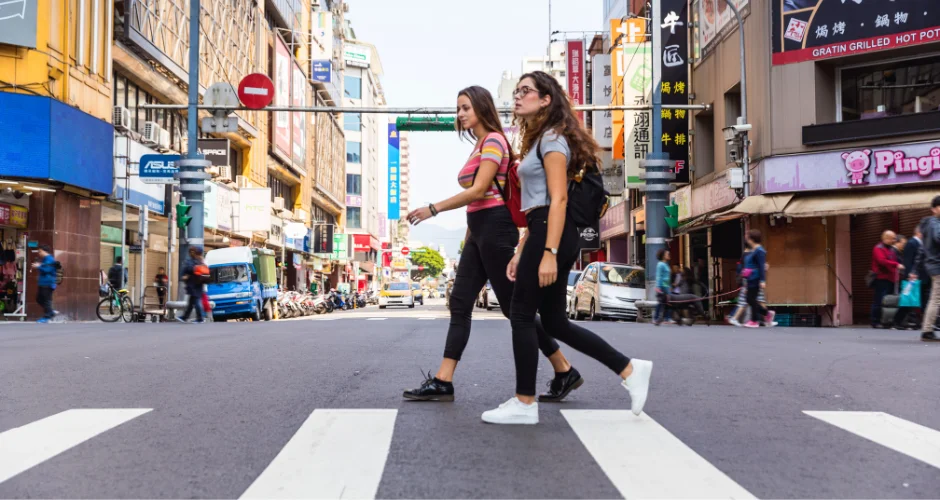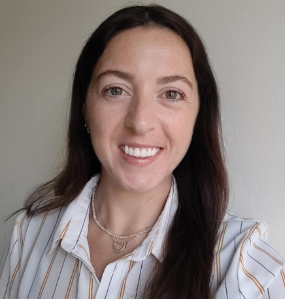GUEST POST
What I Wish I Knew Before Studying Abroad

Moving away from home for the first time can be daunting, especially when considering an unfamiliar country. You may think it takes a specific type of person with heaps of confidence to pull it off, but anyone can do it with some support. That’s why I’m sharing some handy tips to make it easier, having been through it myself when moving to another country to study and travel.
There are several ways to apply to study abroad, including through your UK school or college, international organisations, exchange programmes, the Turing Scheme, or by applying for scholarships. The processes may take up to a year in advance, but the benefits are some of the most rewarding you'll get to experience in life.
When you get accepted, don’t doubt yourself! It means you have what it takes, but balancing your new life in a different place can feel overwhelming. What is certain, however, is that you'll make life-long memories and grow far more independent and resilient.
How to Make Friends Abroad

Your first thought might be, ‘I don't know anybody there’. But know you're not alone, 7 % of UK postgraduates and around 7.5 % of undergraduates participate in study‑abroad or international placement programmes (1). UK graduates increasingly choose to live and work abroad, supported by schemes like Erasmus (before 2020) and now the Turing Scheme (2).
Many international students and universities often run events for young people to meet. You can join societies and clubs to mingle and bond over shared interests like hobbies and sports. Students also report success using apps, forums, and social media groups to meet fresh faces (3).
If you’re unsure which ones are popular in the chosen country, do an online search on the options available to you. Also, don't be afraid to say yes to a new hobby or sport; you’ll notice many people who do this primarily for the social aspect. It's also a great way to keep active!
You may think you'll be too busy studying, but developing a supportive network and group of friends is key to thriving and success when studying abroad, no matter how long you choose to stay. If finding your tribe takes time, don’t worry - prioritise quality relationships over quantity to balance social, academic, and personal aspects of your new life. Try one unique activity every week and see where it takes you!
Deciding on Your Destination

The allure of studying abroad is that it pushes you out of your comfort zone and allows you to meet people from diverse backgrounds and nationalities. Every day is a learning day, whether in or out of classes. Learn from others’ experiences and choose places to visit with history, culture and natural climate or landscape that interest you.
If you choose a university in a well-known city, you'll observe more people speaking English than if you went to a small-town university. Further away means a more local feel and more chances to master the language and culture.
There's no right or wrong place to go; it's down to personal preference. I spent a year in Thailand and lived in a suburb just outside Bangkok; it was a truly local experience. I found accommodation near my school outside the city, but still in close enough proximity to enjoy the hustle and bustle.
Culture Shock
Many students encounter culture shock; navigating this is all part of the excitement. You're likely to form a connection with people you'll be living with, and you may encounter students who have been there for longer, so they’ll have all the best tips and advice; all you need to do is ask.
It might feel like you’re lost or confused, but it's part of the journey. Don’t take it too seriously; if you find yourself in an awkward situation, laugh it off or even apologise if needed. Everyone will know you're still learning the ropes.
Learning the Language
In a multicultural world, you may pick up words and phrases from the local language. Practice speaking to locals and note how friendly and accepting they are when they see you trying to get involved. They’ll appreciate the effort, and it goes a long way towards immersing yourself in the culture.
You can set up an exchange with a local where you help them conversationally learn your native tongue and vice versa; this is usually a free exchange over coffee, and you can gain a new friend. All this gives you the taste of becoming a global citizen! Speaking with a native is the best way to learn a language, so if you want to do some prep ahead of time, consider hiring an online tutor to learn the basics before you get out there.
Knowing key phrases can help you if you ever find yourself stuck or in need of directions, as we all know, Google Maps and public transport times aren’t always accurate. Before long, your confidence and curiosity will grow.
Balancing Study and Travel
You can do it all if you do it right. Here are some easy-to-follow tips for the ideal study-life balance:
- You’re not on holiday, manage your time and prioritise deadlines.
- Weekends are essential for resetting; save at least one per month to catch up on rest.
- Be organised, save public holidays and breaks in your calendar to plan around.
- Stay local; you’ll still gain a lot by making small day trips.
- Work on the go; take your work and laptop on journeys and transport.
Travel Smart

Safety should be your priority when travelling, whether with friends or alone. Thankfully, it’s easy to get SIM cards and eSIMs at the arrivals lounge or even prebook before arrival to keep you constantly connected. Keep close people updated with your plans, and download free offline maps such as MAPS.ME in case you’re out of signal.
You can use GPS tracking apps to update people. Snapchat Maps has optional location sharing, and Polarsteps is great for journaling your trips. It also has offline GPS logging for family and friends to follow along.
Transport
Download regional taxi apps like Uber and Bolt. That way, you know the driver's details and benefit from their door-to-door service. These transport apps usually accept card payment, so there’s less of a need to carry cash with you. A small amount of cash is advisable, but consider securing it well in money belts and zip-up pockets so it’s harder to target in busy public spaces.
Money & Insurance
Banks such as Monzo, Starling, and Revolut offer travel cards with low or no exchange fees and better rates for international currencies. I used them for cashless payments and withdrew cash abroad using them, though they often have a limit, so read the T&Cs carefully. I could also track my spending, set myself budgets, and create savings pots.
If you wish to upgrade to their more premium plans, they often include insurance on medical, travel, and personal belongings. I got a free trial with Revolut for 3 months, which included travel insurance and a free VPN to help access websites from back home. Other banking apps like Wise can be used to make quick online transfers using international currencies. These are just some I have tried in the past with success. Please be sure to research which bank is most suitable for you.
Travel Documents
Apply for visas in advance, as they may require time to obtain and require specific health records or vaccinations. Check whether you need to apply for online e-visas or if you need to visit the consulates in person as well. E-visas purchased online need to be activated at the airport, so don’t plan to enter the country before you receive the correct documents.
Visas on arrival may have a limit on the number of days you’re allowed to visit a country. If you’re on a trip, pay attention to the expiry date, or you might land yourself in a situation of paying hefty fines if you overstay (Indonesia charged me $100 per overstay day!).
Finally, check that your passport has at least 6 months before the expiration date; many places will refuse travel or entry if they find it to be 6 months or less, even your home country.
Budgeting Tips for Students Abroad

My advice is, if you know you want to travel, start saving early. Whether you have a little or a lot of savings, a lot of money will be allocated for housing, tuition, and course expenses. Look up the daily cost of living in the places you’re considering studying and living in. Is it easy to commute around there? Can you take public transport easily, or will you need to book some domestic flights?
Rome2Rio can give guidance on travel planning, often with prices and times. For flights, Google Flights and Skyscanner are at the top when comparing flight prices. FOMO is real; you'll need pocket money for incredible new adventures.
If money is an important factor, consider places that offer one or more of the following:
- See if there are scholarships and grants on offer for international students before you go to help with finances.
- You may want to look for part-time work but be careful to research your student visa to see what hours you're allowed to work per the country’s laws.
- Look out for tourist passes in cities that give you unlimited travel, especially on metros or trains, where you'll be using them multiple times.
- Student-friendly places will offer student discounts in many retailers and restaurants for savvy spenders.
- Staying in Airbnb accommodations and hostels is a great way to save money and meet new people.
- Research is key! Use TripIt or other apps to build an itinerary to be more prepared and aware of your budget needs.
Emotional Adjustment

Not every day will feel like an adventure; some days will be lonely or confusing, and that’s okay. Exploring unfamiliar locations can be overstimulating. Don’t feel you have to do everything; you'll easily burn out.
Take time to rest, slow down, and enjoy your current surroundings. It takes time to feel settled. Don’t panic if the first month is hard. Homesickness is real, but remember that your family and friends are only a video call away.
Writing a journal or daily blog kept me on track. You can note your feelings and funny or awkward moments, and it'll be easier to process. It also doubles up as a keepsake for your memories later down the line. I met a girl who had a notebook, and everyone she met wrote a short message or memory in it, offering a unique perspective and unforgettable interactions.
If it all seems a little much, there are student support services available through the university to help you with your well-being and mental health. It’s always helpful to talk to someone; look for online or face-to-face services offered by students who understand exactly what you’re going through. No issue is too small or difficult to work through.
Summary
Everyone’s experience of studying and living abroad is unique, and it isn’t always as it seems on social media. Try to limit your expectations and keep an open mind. It may take time to settle and make friends, but it’s intrinsic to your growth; you’ll become more adapted and independent.
Journaling helps you record your daily progress, reflect on new encounters, and capture memories. Stay focused on your goals, be kind to yourself, and remember why you went in the first place. Studying abroad opens many great opportunities for personal and professional development: improved skills, global awareness, and employability. Take it all in and appreciate every moment.
This blog is not affiliated with or sponsored by any of the mentioned businesses. The reviews are included for informative purposes.
References
- Hamilton, J. (2023) Rethinking study abroad students' social networking. International Journal of Intercultural Studies, 29(2), pp. 45–62. (Accessed: 25 June 2025).
- Office for Students (n.d.) Studying abroad. (Accessed: 25 June 2025).
- Universities UK International (2020) International facts and figures 2020. (Accessed: 25 June 2025).
Parents
Students

Rebecca M
Tutor
Student-Led Science Learning with an Expert Teacher & Examiner
Looking for a tutor?
Sherpa has hundreds of qualified and experienced UK tutors who are ready to help you achieve your goals. Search through our tutors and arrange a free 20 minute introduction through our industry-leading online classroom.
Find a TutorSimilar Articles
COP26 x Education
Climate change is a worldwide issue that we cannot hide from, it should be dealt with, with the utmost urgency and importance.
James Gurnett
30th July



